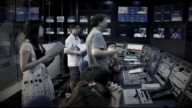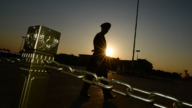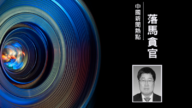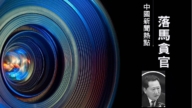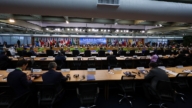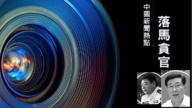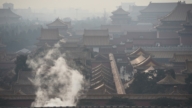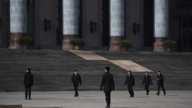【新唐人2013年02月27日讯】中共十八大后,中央新一届领导层誓言反腐,多次对反腐工作发表重要表态。中央纪委书记王岐山日前表示,纪检监察干部不准“越权批办、催办或干预”有关单位的案件处理等事项,也不准以案谋私、办人情案。一党专制下,王岐山如何惩治“上有政策、下有对策”的腐败官场现象?
中共中央纪委书记王岐山在十八届中央纪委二次全会上发表工作报告,他说,各级纪律检查机关要把维护政治纪律放在首位,严肃查处违反政治纪律行为,决不允许公开发表同中央决定相违背的言论,决不允许“上有政策、下有对策”,决不允许有令不行、有禁不止。
报告还指出,将严禁利用职权和职务影响,为配偶、子女、子女的配偶及其他亲属经商办企业提供便利条件,加强对配偶子女均已移居国外的国家工作人员的管理和监督。
中共喉舌媒体按惯例大幅报导王岐山的工作报告,还提到所谓的深入学习贯彻党的十八大精神,努力开创党风、廉政建设,和反腐败斗争新局面等方面的新口号。
前《新华社》记者高瑜:“今年我估计把王岐山报告现在发表,主要是赢得百姓的好感,因为腐败问题是现在老百姓最痛恨的问题,也是官民矛盾一个重要方面。”
前《新华社》记者高瑜还认为,这份报告只是为新中央完全接班而造势。
高瑜:“不过王岐山讲话里有个非常重要问题,就是他提出来党的政治纪律,政治纪律就是有一个‘地方服从中央’,加强中央的集中领导。而且把政治纪律放在经济腐败的一个突出位置,这就看出来了,这种中国特色的反腐,实际上还是要加强一党专政。”
那么,在一党专政的基础下,王岐山如何惩治“上有政策、下有对策”的腐败官场现象?
前大陆史学教授刘因全:“一个党自己专制,自己垄断了所有的权利,然后再监督自己的官员,官员都是属于一个帮派的,帮派之内的这些人,即使违反了党纪、国法,也不会受到惩罚,想他们还会受到保护。相反,其他派系的人因为派系站错了队就会受到惩罚,就会被纪律检查委员会来查处。”
刘因全认为,要彻底解决干部腐败问题,还是要实行多党制和三权监督,他建议建立像“廉政公署”这样独立的监察机构。
高瑜:“应该是你要在根本制度上,共产党必须获得实际的监督,这个监督一方面有媒体和另一方面就是独立司法,另外使老百姓有发言权,如果人民权利得不到保障,新闻没有自由,司法不独立,还是要听你党委的。所以这种最根本上的监督形成不了。”
王岐山被外界称为中共新任总书记习近平的“清道夫”,习近平要做什么,都是王岐山开路。王岐山在这次的工作报告中强调,今年是换届之年,要确保换届风清气正,完全呼应习近平早先的反腐,要“依法治国”。
高瑜:“王岐山很聪明,他在前一段讲话里提出来我们先是要治标,为治本创造条件,这个话里面埋下来了,反正就是五年,他这五年具体能不能揪出几个大老虎,或者普遍抑制住这种苍蝇满天飞的腐败局面,他是我做到哪算哪,反正就五年。”
在大陆老百姓的眼里,中纪委早已是一个利益集团,一些反贪官员通过反腐来敛财。近期的大陆《财经》杂志,报导了“公海赌王”连卓钊与多名省部级官员形成超级分利联盟,黑道与白道互为利用、商界与政界交相渗透。他们通过公海赌船、洗钱网络等方式,大量走私、行贿、洗钱。
报导说,连卓钊和这些贪腐官员在国家秩序之外,构建了强大而有力的次级秩序。在这一秩序中,黑道帮派规则大行其道,社会公共秩序毫无尊严。
采访/刘惠 编辑/黄亿美 后制/郭敬
How Wang Qishan Acts Over Anti-Corruption?
After the Chinese Communist Party’s (CCP) 18th Congress,
the new leadership vowed to fight corruption.
They made several important statements
in a working report.
Wang Qishan, the secretary of the Central Discipline
Inspection Commission, said that members aren’t allowed
to intervene in relevant cases because they are not allowed
to abuse the power for personal gain.
Under the one-Party system, how does Wang punish
corrupt officials?
At a second session of CCP’s 18th Congress,
Wang Qishan put together a work report.
He said each level in the discipline department must maintain
political discipline as a priority.
One who breaks a rule will be severely punished,
and is absolutely not allowed to publicize expressions against the central government.
Also not allowed is having an independent policy dealing
with the central government, disobeying central government orders or choosing not to carrying them out.
The report also said using one’s position to help family
members do business or strengthen control
and supervision of the children of governmental staff
members who have moved abroad is prohibited.
CCP state media have traditionally
reported a lot on Wang Qishan’s report.
The media encouraged further study of the report,
and to carry out the spirit of the 18th Congress.
To work hard to develop the CCP’s characteristics
and anti-corruption initiatives towards a new level.
Gao Yu, former Xinhua News Agency reporter, “I guess that
the purpose of releasing Wang Qishan’s report is to win the public goodwill.
Corruption is most abhorred by the public, it is also one
of the biggest causes of conflict between officials and civilians.”
Gao Yu believes that this report is only to promote
new leadership’s completion on transition.
Gao Yu: “Wang Qishan’s report raised an import issue.
He mentioned the CCP’s political discipline.
Discipline refers to the local (governments) obeying
the Central government in order to strengthen the centralized leadership.
To stress political discipline among economic corruption,
we can see, China’s characteristic anti-corruption.
In fact, their purpose is to strengthen the one-Party dictatorship.”
Under the one-Party dictatorship, how does Wang Qishan
punish those that flout the rules?
Liu Yingquan, a former history Professor in Mainland China:
“The One-Party dominates all the power, then monitor its officials.
Officials have their own factions with members who break
the rules of the CCP.
They won’t be punished, but will be protected.
Outside factions who have made mistakes will be punished
and the discipline commission will investigate.”
Liu said, to completely solve the corruption problem,
they must carry out multi-parties and supervision systems.
Liu suggests setting up an independent organ such
as the “Independent Commission Against Corruption.”
Gao Yu: “You should consider the fundamental
system aspect.
The CCP must have practical supervision.
The supervision includes media, independent judiciary.
In addition, people should be allowed freedom of expression.
If the people’s rights can’t be secured, the media
has no freedom, and the judiciary is not independent,
in the end, they have to listen to the CCP committee.
Thus the basic supervision can’t be formed.”
Wang Qishan was seen as Xi Jinping’s “street cleaner.”
If there’s anything Xi wants to do, Wang will lead the way.
In the report Wang stressed that this year is the year
of leadership transition, during which must be ensured smooth and upright.
He completely echoed Xi’s anti-corruption move,
by saying “rules of the law” must be implemented.
Gao Yu: “Wang Qishan is very clever.
His previous talk mentioned dealing with detailed issues first
in order to create conditions for solving the key problem.
His words hinted that in five years, they can catch
a big “Tiger,” or restrain corrupt situation-like “flies” flying everywhere.
Wang only does what he counts, only for five years.”
In the eyes of the Mainland people, discipline commissions
are interest groups.
Anti-corruption officials obtain personal gain
via anti-corruption.
Recently, Caijing magazine in Mainland China reported
that Lian Zhuozhao, owner of a gaming ship, Neptune.
which operates in waters, has formed a super benefit-union
with many provincial officials.
Mafia and officials, businesses and political figures
mutually utilize this union.
They used gambling ship and money-laundering networks
for smuggling, bribery and laundering money.
The report said they are beyond country’s rule, and have
formed strong and powerful secondary community orders.
In these orders, mafias do what ever they want,
and the public orders lose the dignity completely.


